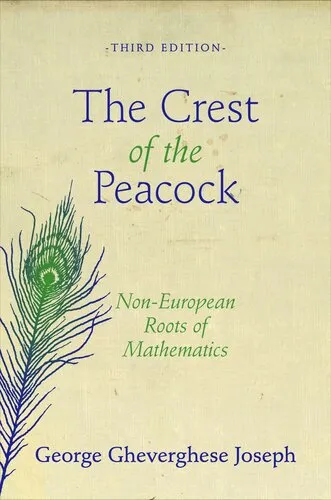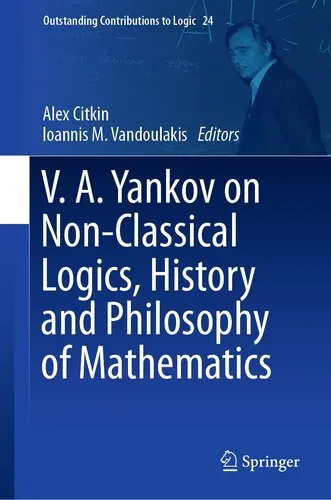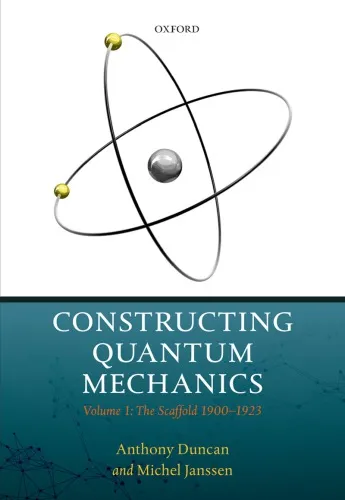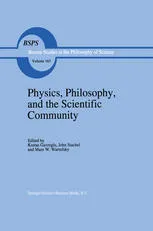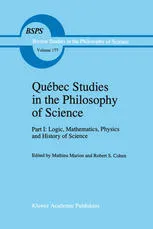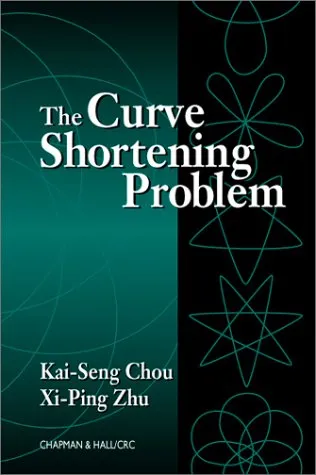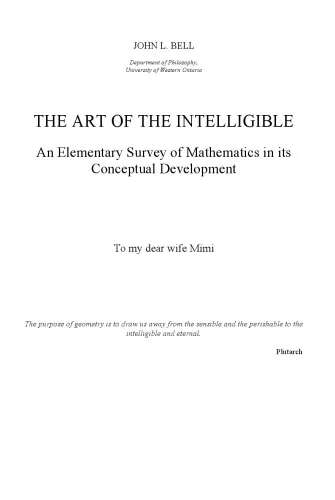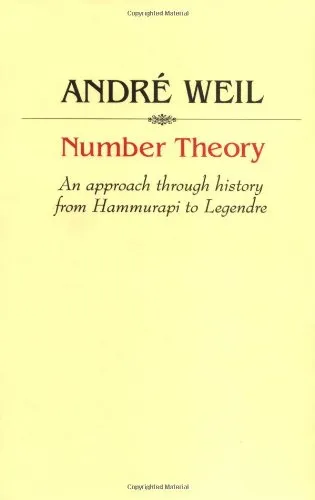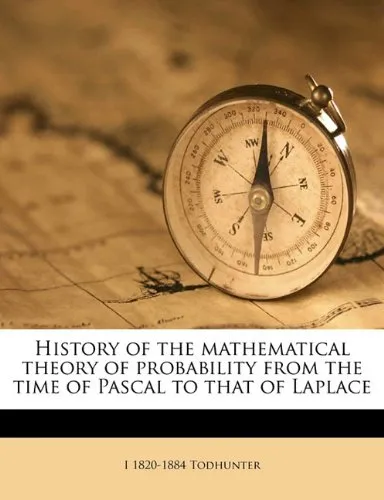A short account of the history of mathematics
4.2
بر اساس نظر کاربران

شما میتونید سوالاتتون در باره کتاب رو از هوش مصنوعیش بعد از ورود بپرسید
هر دانلود یا پرسش از هوش مصنوعی 2 امتیاز لازم دارد، برای بدست آوردن امتیاز رایگان، به صفحه ی راهنمای امتیازات سر بزنید و یک سری کار ارزشمند انجام بدینکتاب های مرتبط:
معرفی کتاب: A Short Account of the History of Mathematics
کتاب A Short Account of the History of Mathematics اثری است ماندگار از W. W. Rouse Ball، یک ریاضیدان و نویسنده برجسته که تاریخ ریاضیات را با دقت و وسواس علمی بررسی کرده است. این کتاب به طور خواسته شدهای به روایت سیر پیشرفتهای ریاضی در طول تاریخ فرق میگذارد، از دوران باستان تا عصر مدرن. هدف این اثر، نه فقط نمایش دستاوردهای علمی است، بلکه نمایاندن تأثیر ریاضیات در پیشرفتهای فکری و فرهنگی جوامع بوده است.
خلاصهای از کتاب
کتاب A Short Account of the History of Mathematics به پنج دوره اصلی تاریخ ریاضیات میپردازد: ریاضیات باستان، دوران طلایی یونان، دوره اسلامی و قرون وسطای اروپا، رنسانس، و در نهایت عصر جدید. این کتاب، با دقت خاصی، زندگینامه و دستاوردهای ریاضیدانان بزرگ از جمله Euclid، Archimedes، Al-Khwarizmi، Descartes و Newton را بررسی میکند.
در فصول اولیه، به توسعه هندسه در مصر باستان و یونان پرداخته میشود. در ادامه، نقش برجستهای که ریاضیات در قرون وسطا در دوران اسلامی ایفا کرد مورد تأکید قرار میگیرد. استفاده از الگوریتمها، معرفی Algebra و پیشرفتهای نجومی در این دوره بسیار برجسته است. سپس به رنسانس میرسیم که شاهد بازگشت به تفکرات کلاسیک و همزمان توسعه ابزارهای ریاضی جدیدی چون Calculus بوده است.
در نهایت، کتاب به بررسی انقلابات عمده در ریاضیات قرن نوزدهم و بیستم میپردازد و به خواننده این امکان را میدهد که نقش اساسی ریاضیات در علومی نظیر فیزیک، شیمی و اقتصاد را بهتر درک کند.
برداشتهای کلیدی از کتاب
- درک چگونگی ارتباط پیچیده ریاضیات با فلسفه و علوم طبیعی در طول تاریخ.
- شناخت فرایند تحول مفاهیم ریاضی از جستوجوی حقیقت تا ابزارهای عملی برای حل مسائل پیچیده.
- اهمیت ریاضیات اسلامی در انتقال دانش یونانی و افزودن ایدههای نوآورانه.
- نقش کلیدی ریاضیدانان در ایجاد بنیانهای علمی دوران مدرن.
نقلقولهای مشهور از کتاب
“The study of the history of mathematics shows that the greatest mathematicians had to struggle to master the concepts and methods they created.”
“Mathematics, from its very beginning, has been a practical art, a powerful tool as well as a fascinating intellectual pursuit.”
چرا این کتاب اهمیت دارد؟
کتاب A Short Account of the History of Mathematics همچنان یکی از منابع معتبر و ارزشمند برای فهم تاریخچه ریاضیات است. این اثر، جدای از ارزش تاریخی، به عنوان ابزاری برای تحلیل اینکه چگونه ایدهها و اختراعات ریاضی شکل گرفته و بر دنیای مدرن تأثیر گذاشتهاند، اهمیت خاصی دارد. خواندن این کتاب برای دانشجویان علوم ریاضی، پژوهشگران و هر کسی که به تاریخ علم علاقهمند است، ارزشمند است.
این کتاب همچنین فرصتی فراهم میآورد تا نقش فرهنگها و تمدنهای مختلف در پیشبرد ریاضیات مورد توجه قرار گیرد. از توفیقات علمی تمدن اسلامی گرفته تا شکوفایی ریاضیات در اروپا، تمامی این مراحل بخشی از یک داستان عظیم و جهانی هستند که در این اثر به زیبایی روایت شده است.
Introduction to A Short Account of the History of Mathematics
Written by the mathematician and historian W. W. Rouse Ball, A Short Account of the History of Mathematics is one of the most celebrated works that encapsulates the profound evolution of mathematical thought throughout history. This timeless masterpiece provides readers with a systematic and insightful overview of the development of mathematics, from its ancient origins right up to the 19th century. With its clarity and depth, the book offers an engaging journey through the lives and works of numerous mathematicians whose contributions have shaped the discipline over centuries. Whether you're a student, a historian, or an enthusiast of mathematics, this book serves as an essential resource for better understanding the field and its historical context.
A Detailed Summary of the Book
Rouse Ball's work takes the reader on a chronological journey through the history of mathematics, providing a rich exploration of its roots and evolution. The book begins with an examination of ancient civilizations, such as Egypt, Babylon, and Greece, highlighting their contributions to the foundational aspects of arithmetic and geometry. The monumental works of Greek mathematicians such as Euclid, Archimedes, and Pythagoras are meticulously explained, showcasing their lasting influence on the subject.
Moving forward, the text delves into the transformative contributions of Islamic scholars during the medieval period, who preserved and expanded upon the knowledge of classical antiquity. The Renaissance and European revival of mathematics are explored in detail, with a particular emphasis on figures like Descartes, Newton, and Leibniz, whose work laid the groundwork for calculus and advanced algebra.
Rouse Ball also dedicates sections of the book to the contributions of 18th and 19th-century mathematicians such as Euler, Lagrange, Laplace, and Gauss, whose innovative approaches brought about significant advancements in areas such as analysis, mechanics, and number theory. The text culminates by surveying more contemporary developments in mathematical theories, illustrating how this ever-evolving discipline constantly adapts and grows.
Although written in the late 19th century, the book maintains remarkable relevance as it paints a thoughtful and comprehensive panorama of mathematics, effectively bridging the gap between casual readers and academic experts.
Key Takeaways
- Mathematics has been an intrinsic part of human progress, spanning ancient civilizations to modern advancements.
- The interplay between individual genius and collaborative discoveries has driven the field forward over the centuries.
- The contributions of cultures such as the Greeks, Indians, Arabs, and Europeans showcase the universal nature of mathematics.
- Key advancements such as calculus, algebra, and mechanics have revolutionized both mathematics and science as a whole.
- Understanding the historical development of mathematics provides valuable insight into both its significance and its impact on various fields of human knowledge.
Famous Quotes from the Book
Rouse Ball's book is packed with thought-provoking and enlightening statements. Here are some of the most memorable excerpts:
"The history of mathematics is the history of human thought and ingenuity expressed through the pursuit of order, patterns, and structure."
"Mathematics, while seemingly abstract, has continually been a driving force behind the practical developments of society."
"The genius of great mathematicians lies not only in their discoveries but in their willingness to explore ideas that transcend immediate practicalities."
Why This Book Matters
Rouse Ball's A Short Account of the History of Mathematics is more than just a historical recount; it is a tribute to the human spirit of curiosity and innovation. Understanding the progression of mathematics enables readers to appreciate how fundamental concepts emerged, evolved, and became foundational tools for solving humanity's greatest challenges.
For students, the book provides valuable context, making mathematical concepts more meaningful and engaging. For scholars and educators, it serves as an essential resource to highlight the interconnectedness of history, science, and culture. Furthermore, for general readers, it offers an approachable yet profound narrative that connects mathematics to the broader story of human achievement.
The text stands as a testament to the fact that mathematics is not just a collection of numbers and equations but a vibrant and dynamic field intertwined with human experiences, ideas, and progress throughout history. Few books illuminate this truth as masterfully as Rouse Ball's seminal work.
دانلود رایگان مستقیم
شما میتونید سوالاتتون در باره کتاب رو از هوش مصنوعیش بعد از ورود بپرسید
دسترسی به کتابها از طریق پلتفرمهای قانونی و کتابخانههای عمومی نه تنها از حقوق نویسندگان و ناشران حمایت میکند، بلکه به پایداری فرهنگ کتابخوانی نیز کمک میرساند. پیش از دانلود، لحظهای به بررسی این گزینهها فکر کنید.
این کتاب رو در پلتفرم های دیگه ببینید
WorldCat به شما کمک میکنه تا کتاب ها رو در کتابخانه های سراسر دنیا پیدا کنید
امتیازها، نظرات تخصصی و صحبت ها درباره کتاب را در Goodreads ببینید
کتابهای کمیاب یا دست دوم را در AbeBooks پیدا کنید و بخرید
1235
بازدید4.2
امتیاز0
نظر98%
رضایتنظرات:
4.2
بر اساس 0 نظر کاربران
Questions & Answers
Ask questions about this book or help others by answering
No questions yet. Be the first to ask!
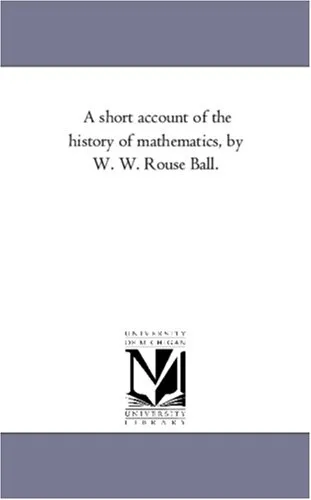

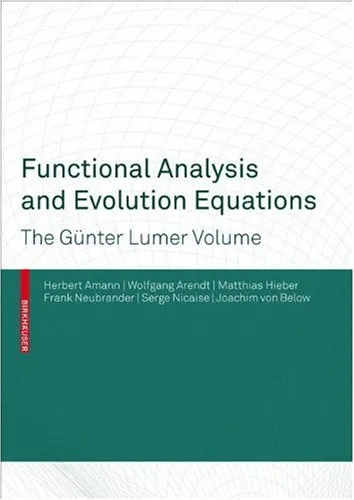
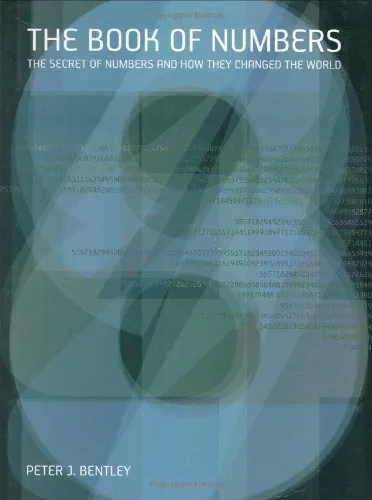
![The Mathematical Experience [Study Edn.]](https://s3.refhub.ir/images/thumb/The_Mathematical_Experience__Study_Edn_16194.webp)
